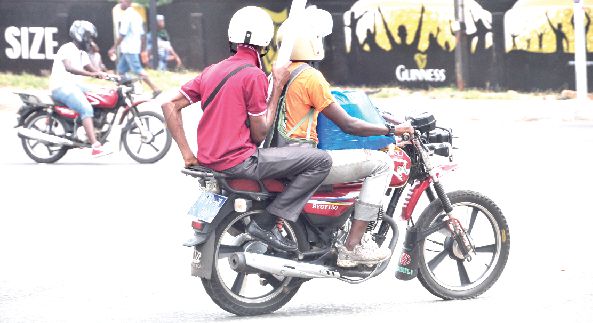Introduction
The “Okadas” motorcycle taxi system simulates intense public discussions throughout Ghana. Okadas emerged from Nigerian origins during the 1990s before they spread to Ghana. A part of transportation method for urban and rural areas relies on Okadas because public transportation services cannot reach these locations (1)(2). A section of the urban and rural population choose Okadas because of its affordability and ability to access remote locations while a large section of the unemployed youth take up the operation of Okada as an income venture. The Road Traffic Regulation 2012 (L.I. 2180) prohibits Okadas but government officials struggle to choose between safety-focused prohibition or economic expansion of the service.
Economic Necessity
Unemployment among young adults has made Okada businesses the essential economic foundation that offers them employment. The lack of adequate formal employment in Ghana makes Okadas the fastest method for people to earn money (3)(4). Okadas create essential informal urban economies through their support of local trade activities and logistics operations and their provision of employment for their riders (3). Official monitoring of Okadas alongside proper oversight would create safer work environments and expand financial possibilities which would drive the integration of current informal economic systems (7).
The majority of rural Ghanaians need Okadas as their main transportation because public transportation does not serve their needs (8)(20). The motorcycles function as essential transportation means in remote areas because they adapt well to poor road conditions. The increasing number of motorcycles leads to job creation in maintenance services and support activities (4)(19).
Security Risks and Safety Concerns
The wide distribution of Okadas throughout the nation produces various unfavorable effects. Official statistics indicate that Okada-related accidents resulted in more than 700 deaths throughout 2019 (9)(10). The dangerous combination of urban riders’ speeding habits with scanty attention and reckless driving actions leads to these alarming statistics (9). Medical facilities treated numerous patients with injuries throughout the first three months of 2020 (21).
Okada misuse leads to both safety threats for the public and criminal activities. Okadas operate outside established structures which exposes them to armed robbery because controlling these vehicles becomes difficult (2)(9). When young adults lose their position as family financial supporters they experience severe social damage (9). Security matters require multiple agencies such as the Ghana Police Service and Ministry of Transport to collaborate for their resolution (13)(16).
Public Perception
Different groups of people hold opposing views about Okada drivers. A section of the public view Okada riders as both a threat to public safety and the vital economic source for unemployed youth (4). The push for strict enforcement meets resistance from those who support developing regulated safety systems which creates a policy deadlock (6)(14).
Case Studies and Regional Realities
The Volta Region and several other regions within the country depend on Okadas because these vehicles function as the only available transportation system in areas without conventional transport (23). Research findings indicate that Okadas now serve as replacements for public transit services in the market (6)(8).
The widespread use of okadas exists in relation to multiple socio-economic issues which include high unemployment and poverty rates. Research conducted in Nasarawa State Nigeria revealed that 38.57% of participants identified unemployment and poverty as major obstacles to economic expansion which negatively impacted their business operations and resulted in higher crime statistics (4). The observations demonstrate how okadas function as both employment opportunities for numerous riders while representing the economic challenges which affect their communities.
Regulatory Framework and Policy Gaps
Okadas are illegal according to Ghanaian traffic laws but the authorities struggle to enforce these regulations properly. The proposal for L.I. 2180 includes union creation to enhance coordination and responsibility as stated in (14)(24). The government maintains unclear policies and inadequate enforcement systems which results in persistent legal ambiguity. All stakeholders need to study both financial advantages and safety risks to public health.
Okadas fulfill tasks beyond transportation because these vehicles address vital national problems through social-economic solutions. Through its transportation services youth empowerment occurs at the same time as commercial operations which help students access educational facilities and employment (25). The increasing number of Okadas creates challenges for urban traffic management but simultaneously leads to environmental pollution and safety issues in nearby areas (15)(26).
The establishment of unions for motorcycle and tricycle operators has been proposed to facilitate better coordination with law enforcement, aiming to improve order within the sector (14). However, there are concerns about the potential risks associated with legalizing okada operations.
Countries like Kenya and Uganda, which have seen a rise in okada use, report challenges such as increased traffic accidents and fatalities, raising questions about whether legalizing these services will lead to sustainable transportation solutions or exacerbate existing safety issues (24)(8).
Conclusion
The debate about Okadas in Ghana persists because people face challenges between their economic needs and the necessity of public safety measures. Severe safety hazards outweigh the essential services that Okadas provide, because these vehicles fail to comply with safety standards and regulations. The implementation of strict regulations through licensing as well as training and safety equipment and union organization provides a solution that maintains advantages while addressing safety concerns. The government needs to choose between immediate Okada regulation or developing improved public transportation systems. The dispute between necessary measures and safety risks will escalate in severity unless some necessary interventions occur.
References
(1)https://en.wikipedia.org/wiki/Okada_(motorcycle_taxi)
(2)https://ama.gov.gh/documents/The_okada_phenomenon-to_legalize_or_to_maintain_the_ban_.pdf
(3)https://www.aceye.org/okada-business-safety-or-saving-livelihoods-a-cause-effect-analysis/
(4)https://www.facebook.com/groups/1344892366169988/posts/1654022408590314/
(5)https://journals.flvc.org/ASQ/article/download/136140/140641/262388
(6)https://theannouncergh.com/article.php?id=9292
(8)https://www.ghanaweb.com/GhanaHomePage/NewsArchive/Okada-supports-Ghana-s-economy-Alabi-1060567
(11)https://thebftonline.com/2020/09/16/understanding-the-okada-economy-legalise-and-regulate/
(14)https://ghanaiantimes.com.gh/okada-ban-and-the-spread-of-covid-19-pandemic/
(15)https://citinewsroom.com/2020/08/high-rate-of-okada-deaths-let-us-learn-from-nigeria-article/
(17)https://thecustodianghonline.com/the-safety-of-motor-cyclists-or-okada/
(19)https://www.modernghana.com/news/1385541/of-okada-aboboyaa-and-streetlights-in-accra.html
(20)https://journals.aphriapub.com/index.php/NAUJS/article/download/2439/2252/3950
(22)https://journals.flvc.org/ASQ/article/view/136140/140641
(23)https://bmcpublichealth.biomedcentral.com/articles/10.1186/s12889-024-20814-0
(24)https://thebftonline.com/2025/03/28/the-long-ride-to-okada-legalisation/
(25)https://socialscienceresearch.org/index.php/GJHSS/article/view/100311/5-The-Effect-of-Socio-Economic-Survival-of_tex (26)https://starrfm.com.gh/wp-content/uploads/2020/09/FINAL-report-okada-studies.pdf






























